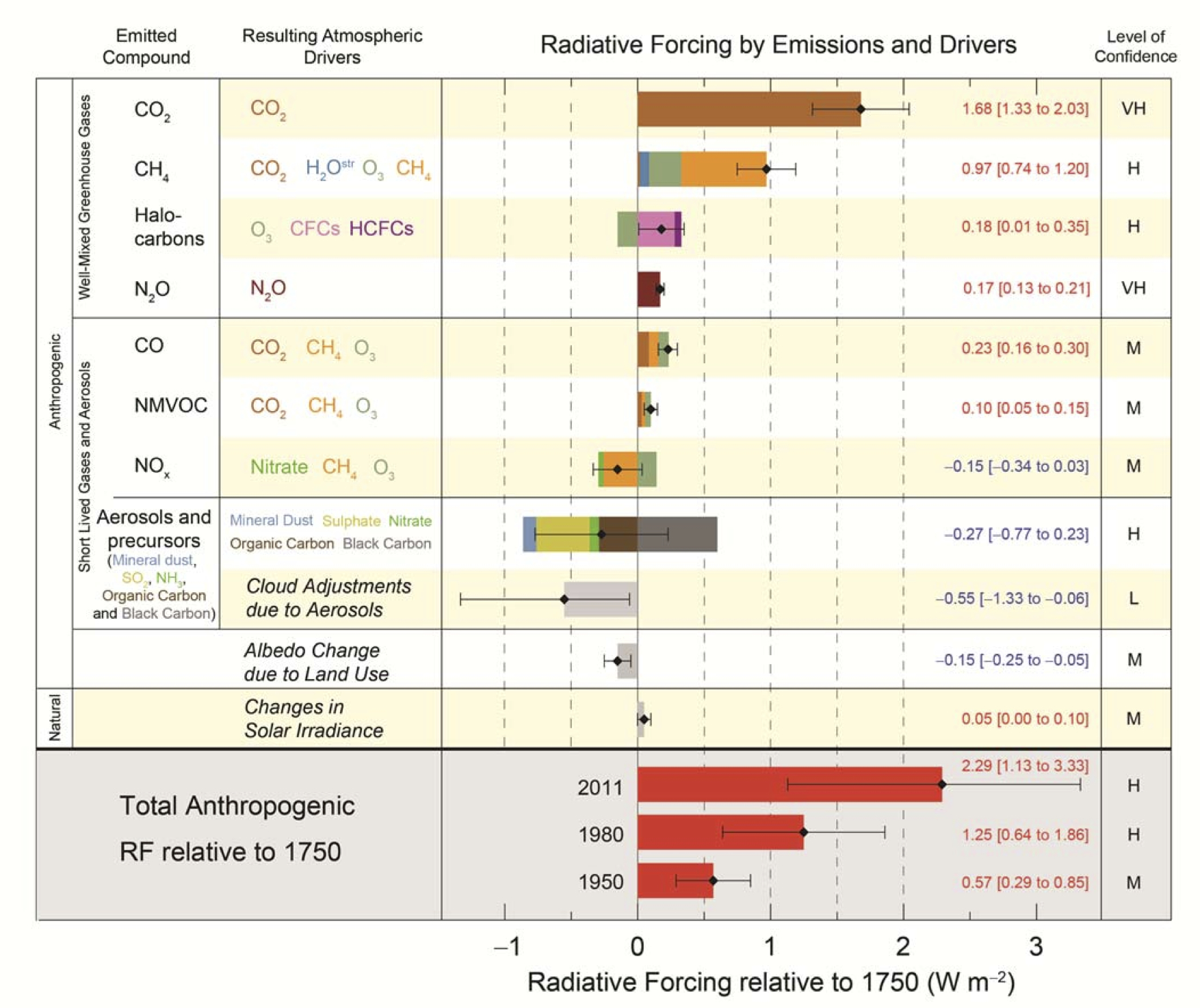
In an online discussion last week I was directed to a 2012 article on the Forbes website written by businessman named Warren Meyer, titled Understanding the Global Warming Debate. The article contains a wide range of misleading and misinformed assumptions ostensibly to explain why there is a debate on climate change. I always see dissecting articles like these as a great opportunity to better understand the actual science over the perceived controversy of climate contrarians. Though the reference is somewhat dated now, this is the internet, so it lives in virtual perpetuity relative to how much traffic it receives. Over the past 5 years this article has received 186,000 views. That, in itself, makes this article worthy of addressing as an example of how motivated non-scientists get the science wrong.
Mr. Meyer opens with a misleading attempt to frame the issue as a debate on "catastrophic man-man global warming theory." This approach conflates two very distinct elements of the science on anthropogenic climate change. Nowhere in the published scientific literature can you find the phrase he uses. When I did a search on this term in Google Scholar, what did I find? Mr. Meyer's Forbes article. Also searching "catastrophic man-made climate change" I get a smattering of non-research related materials coming from people who rejecting human influence on climate. Meyer has formed a completely irrelevant and fabricated framing of the issue for the basis of his discussion.
In Mr. Meyer's article he claims this is the "core theory" and states that he will use the IPCC as the primary source for this, even though there is no place where the IPCC frames climate change in this manner.
In explaining "how this works" Mr. Meyer connects greenhouse gas effects, to warming, to impacts, but he immediately begins to demonstrate a lack of understanding about the science.
While he agrees that the adding CO2 will cause the Earth to warm and also agrees that this is almost universally accepted, he claims that climate science is a "young" area of research when, in fact, the research dates back to the 1820s and 1850s. The science on climate is older than the science on plate tectonics. It's older than the science on radiation. It predates our understanding of germ theory. The only way you could possible determine that climate science is a young science would be to define all science as young.
Mr. Meyer accepts the direct warming effects of CO2-only as ~1°C, which is accurate. But immediately he moves into simple errors. He states that, looking only at CO2, he ironically states the "relatively pessimistic" level of 800ppm would only produce a 1°C rise in temperature. This would be only if you also ignore warming since preindustrial, and that would be ignoring any warming already in the system due to thermal inertia from the oceans.
Step three in Mr. Meyer's process is a theory of his own creation called "The Positive Climate Feedback Theory." While we get what he's talking about, it doesn't benefit his discussion to create, as a non-scientist, new terms that don't exist in actual science.
New errors pop up when trying to describe this "theory" where he attempts to describe water vapor feedbacks. He states that the IPCC "assumed" a strong positive feedback from water vapor. The IPCC doesn't assume anything. The IPCC is a collection of leading experts in their fields who ware painstakingly cataloguing the scientific research. Meyer also makes an error suggesting the IPCC "just add" 2-4°C onto the 1°C for CO2 warming. Such figures, again, are completely manufactured by Meyer. They don't jibe with climate sensitivity figures and he provides no reference to what he means with figures like these.
The IPCC actually produces graphs such as the following to quantify forcings on the climate system, which also very clearly indicate levels of scientific understanding and uncertainty ranges.

One more error is, he claims Al Gore states that, "...we will see a tipping point where temperatures will run away, [Gore] is positing that feedbacks will be nearly infinite (a phenomenon we can hear with loud feedback screeches from a microphone)." Nope. Sorry. That is Mr. Meyer's misunderstanding and is nothing that Al Gore has ever stated. Meyer makes no attempt to reference such a comment, because no such quote exists. There are tipping points (plural) in the climate system. If we push past enough of them we will likely create a situation where we lose the capacity to affect the final equilibrium state of the climate through carbon emissions mitigation. It is well accepted that, even if we burned all fossil fuel reserves, we would not face the sort of runaway climate that Meyer describes.
Mr. Meyer goes on to claim that climate feedbacks might be high, but they also might be negative. After this he only bothers to discuss the negative, to the omission of positive feedbacks. Once again, there is no substantive support for such a position offered. By comparison, the IPCC and research scientists take the uncertainties involved with climate forcings and feedbacks very seriously. They clearly quantify and document them. The net result of the research suggests that our climate's sensitivity to forcing centers around 3°C for doubling CO2 concentrations. The low end probability is ~1.5°C, and the IPCC clearly state that anything lower than this is highly improbable.
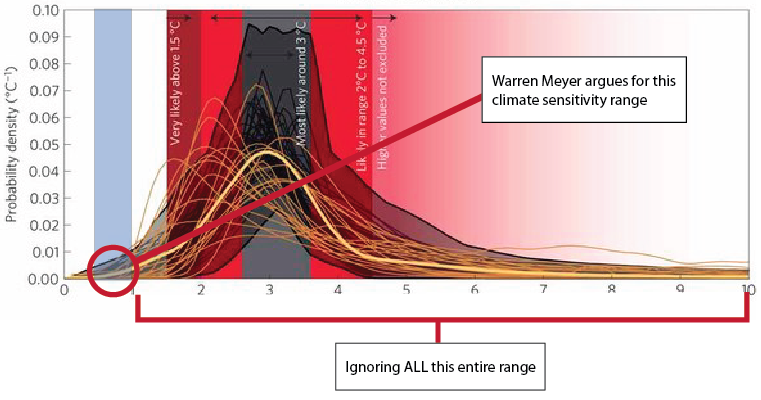
Meyer is trying to claim there is some possibility that climate sensitivity could be less than 1°C, which is an extremely low probability. There is almost no research that can support that claim, and certainly no one could come to this conclusion looking at the full body of evidence available to scientists.
Meyer wants us to take the flawed argument he's proposed and compare those to temperature observations. But, he begins by stating that warming since preindustrial has been about 0.7°C. Clearly that is an error. This is not correct now and it was not even correct in 2012 when he wrote the article. He's most likely looking at the global mean temperature anomaly based on GISS or NOAA, which is based on a 30 year mid-20th century baseline, not preindustrial.
Right on the heels of this, Meyer claims that the surface temperature data are flawed. He does not offer any research supporting this position, he merely makes the claim. Then, after irrationally dismissing the surface temperature data, he turns to satellite data, which he claims, "...are not susceptible to these same flaws and coverage gaps..."
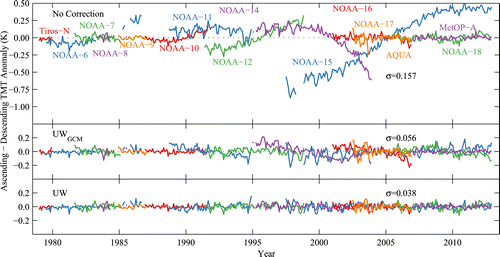
[Figure: satellite raw temperature data]
What Meyer clearly does not understand is that, for one, satellites are measuring something very different from the surface station data. Not only are the satellite data a temperature proxy, they are subject to far more adjustments and errors due to the fact the data have to be calibrated across different satellite missions, different sensors and have to compensate for various orbital adjustments. Surface station data are more consistent and more in agreement across the various groups compiling the data than the satellite data.
Beyond that, satellites are measuring an entirely different part of the atmosphere. Even the lower tropospheric satellite temperature data center about 3 miles up, not at the surface where we live.
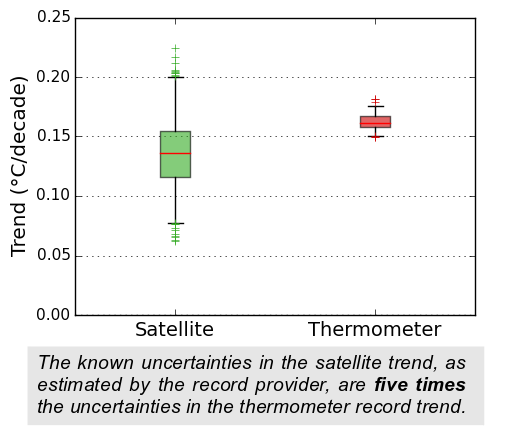
At this point in Meyer's piece, things go a bit muddy. He rants a bit about Obama, Solyndra and Keynesian economics, which don't seem to be relevant as far as I can make out. This attempts to lead up to how the IPCC addresses human attribution with models. But here again, he's clearly not invested the time to fully understand the scientific research.
IPCC does use modeling to help eliminate other natural causes that might otherwise explain the warming we've seen in the past 50 years. Yes, models are imperfect, but climate modelers will tell you that we understand far more with models than we otherwise would without them. They help us validate other science. When climate modelers remove human contributions of CO2, they can't find a way to explain the warming we've seen.
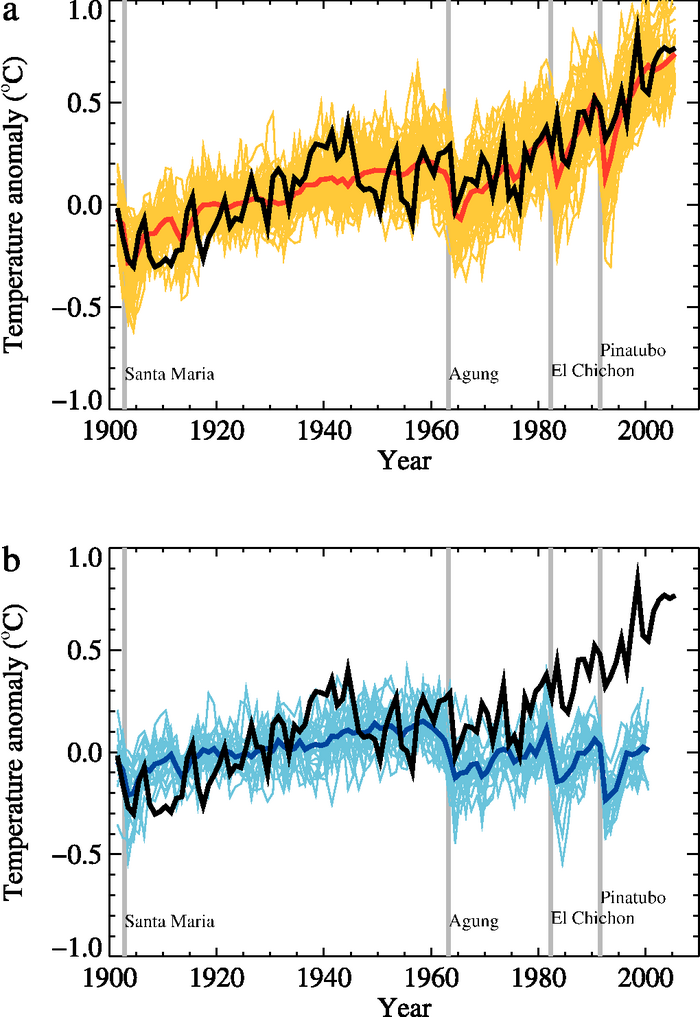
We get the same results when we look at forcings and temperature data. We get the same results when we look at temperature reconstructions. We get the same results when we look at many other areas of research. Models are merely one additional confirmation that what we observe is correct.
Meyer claims that the 0.7°C increase (observations), which he erroneously chose, can't be explained by the theory, which he's misguidedly constructed. He has essentially created a false scenario in order to prove something incorrect, which is the classic definition of a straw man argument.
There are a couple of points in there which I don't want to ding him for relative to Argo data and "the pause", since both of those issues have been put to rest since the time which he wrote the article. Both the points he makes about these are now shown to support man-made warming and are in full agreement with the body of climate research.
After improperly defining the entire question at hand Meyer goes on a grand Gish gallop related to the Pacific decadal oscillation (PDO), aerosol effects, weather extremes, the little ice age (LIA) and the like. There is more than enough material written here on Skeptical Science to answer any questions about these subjects, so it would be redundant of me to individually take these on yet again.
Meyer claims that most "skeptics" don't deny that CO2 is a greenhouse gas, but that's not always been the case. Still today, if you spend any time at WUWT or Roy Spencer's blog, you can see quite a few people who are stating emphatically that CO2 has no effect at all. Many have, over the past decade managed to finally accept the radiative properties of CO2 which have been understood for nearly two centuries. So there is some movement, but there still is much denial in play.
He claims what "skeptics" deny is catastrophe. That's a fascinating observation. I would agree that, if we can rapidly bring down our CO2 emissions over the coming decades to avoid a 2°C rise in global mean temperature, that would avoid much catastrophe. At very least it would act to slow the onset of the catastrophes we anticipate. The potential for catastrophe is a combination of climate sensitivity and emissions pathways. Estimations for climate sensitivity are many and they generally center around 3°C. But even if we err toward the lower end, that doesn't get us out of the potential crisis we face. A lower probability of 2°C for CS only buys us a little more time to decarbonize the global economy, and that would ignore the inherent risk that CS might actually be higher than 3°C.
Meyer ends with an unjustifiable conclusion, stating:
So this is the real problem at the heart of the climate debate — the two sides are debating different propositions! In our chart, proponents of global warming action are vigorously defending the propositions on the left side, propositions with which serious skeptics generally already agree. When skeptics raise issues about climate models, natural sources of warming, and climate feedbacks, advocates of global warming action run back to the left side of the chart and respond that the world is warming and greenhouse gas theory is correct. At best, this is a function of the laziness and scientific illiteracy of the media that allows folks to talk past one another; at worst, it is a purposeful bait-and-switch to avoid debate on the tough issues.
The positions he's put forth in this article are the epitome of lazy analysis and scientific illiteracy. He's bizarrely framed his entire discussion attempting to attack the positions of the IPCC, a body composed of the world's leading researchers, as being scientifically illiterate. One has to ask, from where does his own "literacy" if not from leading climate researchers? It's certainly not based in the available published research which the IPCC reports are based on.
In this, perhaps he's inadvertently answering his own questions in a manner that he would prefer to reject. What are "skeptics" denying? Answer: The scientific research.
This article is just a run-of-the-mill exercise in climate denial Gish gallop. Meyer is picking points he thinks support his argument while actually only possessing a tenuous grasp of the science. So, why does it even matter? Why not just let this one go?
I can think of 186,000 reasons; the number of views of this Forbes article. Forbes is a very high profile publication and thus someone there, at Forbes, decided that it was fine and well to give this person an internet soapbox to promote a position rejecting the climate science which he has absolutely no expertise. He is not genuinely adding to the discussion on climate change but is being placed into a position as someone to listen to. Meyer is polluting the discussion with misinformation and poor analysis which has no bearing on the actual issue of climate change. And thanks to Google, these types of discussions, lacking in any substance, are given equal weight to actual science due to the traffic they generate.
~ ~ ~ ~ ~ ~ ~ ~ ~ ~ ~ ~ ~ ~ ~ ~
Rob Honeycutt
Follow me on twitter @robhon_
Posted by Rob Honeycutt on Wednesday, 8 February, 2017
 |
The Skeptical Science website by Skeptical Science is licensed under a Creative Commons Attribution 3.0 Unported License. |